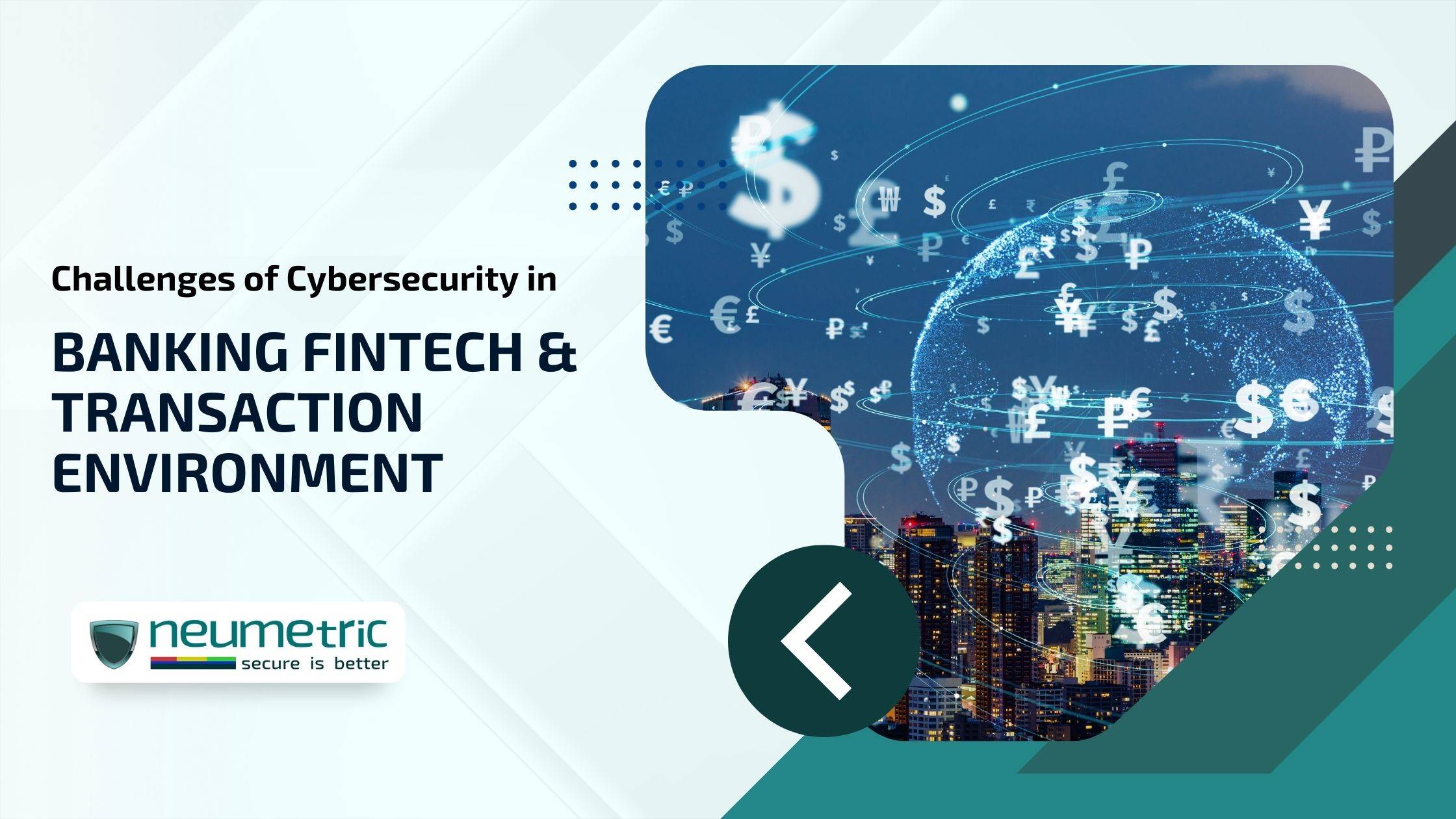Table of Contents
ToggleIntroduction:
Cybersecurity refers to the practice of protecting computer systems, networks & data from unauthorized access, damage or theft. It involves implementing various technologies, processes & practices to safeguard information & prevent cyber threats. Cybersecurity is of utmost importance in the Fintech Industry due to the sensitive nature of financial transactions & the vast amount of valuable data involved.
Fintech encompasses a range of technologies & innovations that aim to improve financial services & transactions. This includes mobile banking, online payment systems, cryptocurrency, peer-to-peer lending & more. As Fintech continues to revolutionize the financial industry, it also brings new challenges & risks in terms of cybersecurity.
This Journal will delve into the specific challenges that arise in the intersection of cybersecurity & the Fintech Industry. Fintech companies handle vast amounts of sensitive data including personal & financial information of individuals & businesses. The digital nature of Fintech platforms makes them attractive targets for cybercriminals seeking to exploit vulnerabilities for financial gain. Therefore, understanding & addressing the challenges associated with cybersecurity is crucial to maintaining Trust, Security & Stability in Fintech & Transaction Environments.
Fintech & Transaction Environment:
The Fintech Industry refers to the use of technology to provide innovative financial products & services. It encompasses a wide range of sectors, including banking, payments, insurance, wealth management & more. Fintech companies leverage technological advancements to streamline financial processes, enhance customer experience & drive financial inclusion. Over the past decade, the Fintech industry has experienced remarkable growth, fueled by digital transformation & changing consumer expectations.
The rapid growth of the Fintech industry can be attributed to several factors. Firstly, advancements in technology, such as mobile devices, cloud computing & data analytics, have paved the way for new & efficient financial solutions. Secondly, consumers have embraced digital channels & expect convenient, accessible & personalized financial services. Fintech companies have capitalized on these trends by offering user-friendly interfaces, faster transactions & tailored financial solutions.
Transaction Environments refer to the digital ecosystems where financial transactions take place. These environments encompass various stakeholders including financial institutions, merchants, consumers & third-party service providers. Traditionally, transactions were conducted through physical means such as cash or cheques. However, with the rise of Fintech transaction environments have become increasingly reliant on technology.
The advancements in Fintech have brought numerous benefits to the transaction ecosystem. Firstly, Fintech has significantly improved accessibility to financial services. Previously underserved populations such as the unbanked or underbanked now have access to basic financial services through mobile banking & digital payment solutions.
Secondly, Fintech advancements have driven efficiency & cost savings in transactions. Automated processes, real-time transactions & streamlined workflows have reduced the time & effort required for financial activities. Fintech solutions such as peer-to-peer lending platforms & crowdfunding have also facilitated faster & more flexible funding options for businesses & individuals.
Evolving Threat Landscape in Fintech Cybersecurity:
The Fintech industry has become a prime target for cyber attacks due to the significant amount of valuable data & financial transactions involved. There has been a notable increase in cyber attacks targeting Fintech companies & transaction platforms in recent years. Cybercriminals exploit vulnerabilities in systems, networks & applications to gain unauthorized access, steal sensitive information & commit financial fraud. The digital nature & interconnectedness of Fintech platforms make them susceptible to various types of attacks, including data breaches, ransomware, phishing & Distributed Denial-of-Service [DDoS] attacks.
Cyber attacks in the Fintech industry are driven by various motives. Financial gain is a primary motive, as cybercriminals target Fintech platforms to obtain valuable financial & personal information that can be used for identity theft, fraudulent transactions or ransom demands.
Examples of major cyber attacks in the Fintech & transaction space:
- One example is the 2018 attack on the Bangladesh Central Bank, where cybercriminals attempted to steal $1 billion through fraudulent transfer requests. Although most of the attempts were thwarted, $81 million was successfully stolen.
- In 2020, the mobile payment platform, MobiKwik, suffered a data breach that compromised the personal information of over 100 million users. The breach exposed email addresses, phone numbers, hashed passwords & other sensitive data, underscoring the vulnerability of Fintech platforms to cyber threats.
Such examples demonstrate the evolving threat landscape in Fintech cybersecurity & the need for robust measures to protect against cyber attacks. Fintech companies must remain vigilant, invest in robust cybersecurity frameworks, regularly update their systems & educate their employees & users to mitigate the risks posed by cybercriminals.
Unique Challenges in Fintech Cybersecurity:
The complexity of financial systems & their interconnectedness pose unique challenges in Fintech cybersecurity. Fintech platforms often integrate with multiple systems, networks & third-party services, creating a complex ecosystem that increases the potential attack surface. Securing this interconnected infrastructure requires robust controls & monitoring to ensure the integrity & confidentiality of financial data.
Fintech companies face the challenge of compliance with industry regulations & standards. Regulations such as the Payment Card Industry Data Security Standard [PCI DSS] & the General Data Protection Regulation [GDPR] impose stringent requirements on data protection & privacy. Achieving & maintaining compliance while balancing agility & innovation can be a complex & resource-intensive task for Fintech companies.
Technological innovations in the Fintech industry, such as artificial intelligence, blockchain & cloud computing, introduce new vulnerabilities & risks. These technologies may have potential security flaws or be targeted by sophisticated cyber attacks. Fintech companies must thoroughly assess the security implications of adopting new technologies & implement appropriate safeguards to protect against emerging threats.
The Rapidly evolving threat landscape & the use of sophisticated attack techniques pose significant challenges to Fintech Cybersecurity. Cybercriminals continually adapt their tactics to exploit vulnerabilities & evade traditional security measures. Fintech companies must stay abreast of the latest threats, employ advanced threat detection & response capabilities & foster a culture of cybersecurity awareness to effectively combat these evolving threats.
Common Vulnerabilities in Fintech Systems:
Payment fraud & unauthorised transactions: Fintech systems are vulnerable to payment fraud & unauthorized transactions, where cybercriminals exploit weaknesses in security controls to initiate fraudulent transfers or manipulate transactions. This can occur through various means, such as account takeover, stolen credentials or manipulation of transaction data.
Data breaches & identity theft: Data Breaches pose a significant threat to Fintech systems, as they can result in the exposure of sensitive customer information, leading to identity theft & financial fraud. Weaknesses in network security, inadequate data encryption or vulnerabilities in third-party integrations can be exploited by cybercriminals to gain unauthorized access to user data. Fintech companies must employ strong encryption protocols, regularly patch vulnerabilities & implement strict access controls to mitigate the risk of data breaches.
Malware & ransomware attacks: Fintech systems are susceptible to malware & ransomware attacks, where malicious software infiltrates the system to steal data, disrupt operations or demand ransom. These attacks can be delivered through phishing emails, infected attachments or compromised websites. Fintech companies should deploy robust anti-malware solutions, regularly update software & educate employees & users about safe browsing habits & phishing awareness.
Insider threats & social engineering: Insider threats, whether unintentional or malicious, pose a risk to Fintech systems. Employees with privileged access may inadvertently disclose sensitive information or fall victim to social engineering attacks, where attackers manipulate individuals into revealing confidential data. Fintech companies should implement strong access controls, monitor employee activities & provide comprehensive training to mitigate insider threats & educate employees about social engineering tactics.
Weak authentication & access controls: Weak authentication mechanisms & inadequate access controls can leave Fintech systems vulnerable to unauthorized access. Common vulnerabilities include the use of weak passwords, lack of Multi-Factor Authentication [MFA] & insufficient controls on user privileges. Fintech companies should enforce strong password policies, implement multi-factor authentication & regularly review & update access controls to prevent unauthorized access to sensitive data & systems.
Impacts of Cyber Attacks in the Fintech Industry:
Cyber attacks in the Fintech industry can result in significant financial losses & erosion of customer trust. Financial institutions & Fintech companies may suffer direct monetary losses due to fraudulent transactions, theft of funds or the cost of remediation & recovery.
Cyber attacks can cause operational disruptions & service unavailability. Downtime resulting from attacks, such as Distributed Denial-of-Service [DDoS] attacks, can prevent customers from accessing Fintech services, leading to frustration & potential financial consequences.
Fintech companies face regulatory non-compliance & legal consequences following cyber attacks. Failure to adequately protect customer data or adhere to industry regulations, such as the GDPR or PCI DSS, can result in significant fines & penalties.
Reputational damage is a severe consequence of cyber attacks in the Fintech industry. News of a data breach or security incident can spread quickly, undermining the trust & confidence that customers, partners & investors have in the affected company.
Strategies for Enhancing Fintech Cybersecurity:
Fintech companies should develop & implement comprehensive risk management frameworks that identify, assess & mitigate potential cybersecurity risks. Additionally, having well-defined incident response plans enables organizations to respond swiftly & effectively to security incidents, minimizing the impact & facilitating a faster recovery process.
Fintech companies should prioritize the implementation of strong security measures such as encryption & multi-factor authentication. Encryption ensures the confidentiality & integrity of data both at rest & in transit, while multi-factor authentication adds an extra layer of protection by requiring multiple forms of identification to access sensitive information. These measures significantly reduce the risk of unauthorized access & data breaches.
Regular Vulnerability Assessments & Penetration Testing are essential for identifying weaknesses in Fintech systems. By proactively identifying & addressing vulnerabilities organizations can prevent potential exploitation by cyber attackers. These assessments should be conducted both internally & through third-party experts to ensure a comprehensive evaluation of system security.
Employees play a crucial role in maintaining the security of Fintech systems. Investing in comprehensive training programs that educate employees about common cybersecurity threats, phishing techniques & best practices for secure use of systems & data can significantly reduce the likelihood of successful attacks.
Fintech companies can benefit from partnering with cybersecurity experts who can provide specialized knowledge & expertise. Collaborating with these experts helps in implementing effective security measures, staying updated on emerging threats & accessing advanced threat intelligence.
Collaboration & Industry Initiatives:
Collaboration & Information sharing among Fintech companies & industry stakeholders are crucial for combating cyber threats effectively. By sharing insights, experiences & best practices organizations can collectively enhance their cybersecurity posture. Collaboration fosters a community-driven approach to security, allowing for early detection & response to emerging threats.
Active participation in industry-specific initiatives & cybersecurity forums provides opportunities to learn from peers, exchange knowledge & gain insights into the latest trends & practices. Industry collaborations can also influence regulatory developments & shape cybersecurity standards specific to the Fintech sector.
Sharing best practices & threat intelligence helps the industry as a whole to stay ahead of cyber threats. Fintech companies should contribute to information-sharing platforms & collaborate with industry organizations to collectively strengthen cybersecurity measures. By sharing lessons learned & insights gained from security incidents organizations can collectively improve their defenses.
Conclusion:
The Fintech Industry faces unique challenges in cybersecurity, including the complexity of financial systems, compliance with industry regulations, vulnerabilities arising from technological innovations & the rapidly evolving threat landscape with sophisticated attack techniques. To effectively address these challenges, proactive measures are essential. Fintech companies must implement robust risk management frameworks, strengthen network & system security, conduct regular assessments, enhance employee training & collaborate with cybersecurity experts.
A secure fintech & transaction environment is of utmost importance for any organisation operating in the Fintech Industry. It ensures the protection of customer data, maintains trust in financial systems & safeguards against financial losses, operational disruptions, regulatory non-compliance & reputational damage. By prioritizing cybersecurity & implementing effective measures, the Fintech Industry can continue to Innovate, Thrive & Contribute to the Growth & Advancement of the Digital Economy.
FAQs:
- What are the major challenges in Fintech?
The major challenges in FinTech include cybersecurity threats, regulatory compliance, technological innovation & managing complex financial systems.
- What is the role of cybersecurity in Fintech?
The role of cybersecurity in FinTech is to protect sensitive customer data, secure financial transactions, prevent fraud & maintain the trust & confidence of customers in the digital financial ecosystem.
- What are the biggest risks of Fintech?
The biggest risks in Fintech include data breaches, identity theft, payment fraud, operational disruptions & regulatory non-compliance.
- What are the barriers to Fintech?
Barriers to Fintech adoption include regulatory hurdles, limited access to capital, resistance from traditional financial institutions & the need for customer education & trust in digital financial services.





